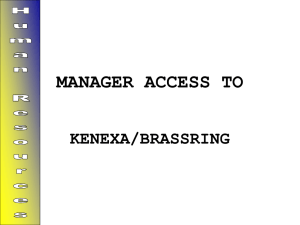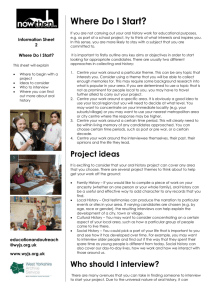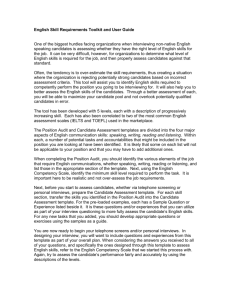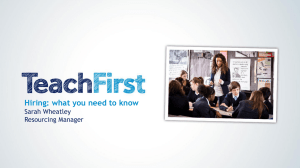Conducting Interviews
advertisement
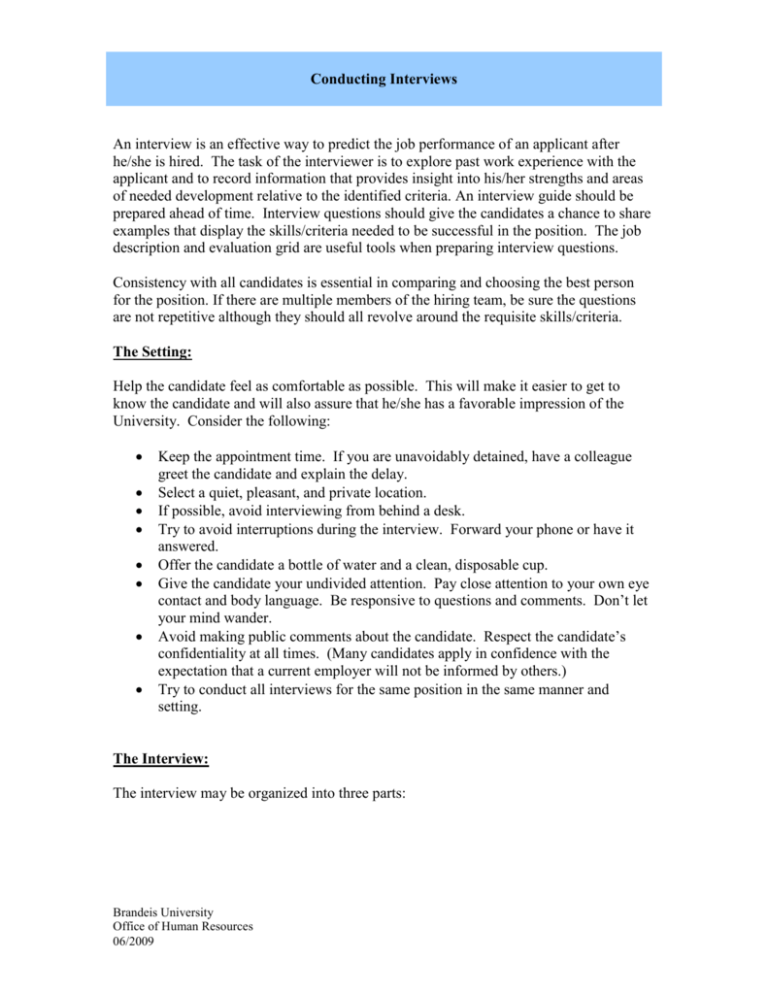
Conducting Interviews An interview is an effective way to predict the job performance of an applicant after he/she is hired. The task of the interviewer is to explore past work experience with the applicant and to record information that provides insight into his/her strengths and areas of needed development relative to the identified criteria. An interview guide should be prepared ahead of time. Interview questions should give the candidates a chance to share examples that display the skills/criteria needed to be successful in the position. The job description and evaluation grid are useful tools when preparing interview questions. Consistency with all candidates is essential in comparing and choosing the best person for the position. If there are multiple members of the hiring team, be sure the questions are not repetitive although they should all revolve around the requisite skills/criteria. The Setting: Help the candidate feel as comfortable as possible. This will make it easier to get to know the candidate and will also assure that he/she has a favorable impression of the University. Consider the following: Keep the appointment time. If you are unavoidably detained, have a colleague greet the candidate and explain the delay. Select a quiet, pleasant, and private location. If possible, avoid interviewing from behind a desk. Try to avoid interruptions during the interview. Forward your phone or have it answered. Offer the candidate a bottle of water and a clean, disposable cup. Give the candidate your undivided attention. Pay close attention to your own eye contact and body language. Be responsive to questions and comments. Don’t let your mind wander. Avoid making public comments about the candidate. Respect the candidate’s confidentiality at all times. (Many candidates apply in confidence with the expectation that a current employer will not be informed by others.) Try to conduct all interviews for the same position in the same manner and setting. The Interview: The interview may be organized into three parts: Brandeis University Office of Human Resources 06/2009 The opening: (3-5 minutes) Introduce yourself. Welcome the candidate to Brandeis and explain your role in the interviewing process. Explain the structure of the interview process, and let the candidate know you may be taking notes. Keep small talk relevant and avoid questions that could be interpreted as probing for personal information. Interview questions: (30-45 minutes) These questions should be determined before the interviews and be consistent with all candidates. Based on the principle that past behavior is the best predictor of future performance, interviews should focus on gathering data about how candidates behaved in previous situations similar to situations they could face in this position. The interviewer should seek specifics about the following areas: tasks, assignments, or issues the candidate has had to face; what the candidate thought, said and did in that specific situation; and outcomes of the candidate’s actions and their impact on others. Here is a way to construct questions in order to receive more specific examples from the candidate. “Tell me about a time when…” “Describe a situation when you had to…” “What did you do…” “How did you…” All interview questions should be job-related and based on the job description and/or evaluation grid criteria/skills. See Sample Interview Questions for more information. A Human Resources representative can provide additional interview questions and help you prepare for the interviews. Avoid questions or discussions about: Race, color, sexual orientation, religion, national origin, age, marital status, veteran status, disability, height, weight, and genetic information Personal or political activities Marriage plans, family, children, or child care arrangements How much longer a candidate plans to stay in the work force The close: (10-12 minutes) Invite the candidate to ask any final questions. During this time answer any final questions and refer the candidate to the University’s web site or the Office of Human Resources for additional information about working at Brandeis. Explain how the process will proceed including a timetable. Thank the candidate for his/her time and interest in the position. Promote the University during the interview as a great place to work. Sometimes giving details about additional benefits can make a difference in a candidate’s decision. Talk about the benefits enjoyed by staff at Brandeis, including medical, dental, vacation, competitive retirement matching, etc. A Human Resource representative may also be available to speak with candidates in more detail about the various benefits offered by Brandeis. Brandeis University Office of Human Resources 06/2009 During the interview listen for the following “areas to follow up:” Unexplained gaps in employment history Areas where the candidate cannot provide details Candidates who have quit a job without adequate notice Candidates who reveal proprietary information about a previous employer or confidential information about other employees A Human Resources representative is available to speak with candidates after their interviews. This call provides the following feedback: Candidate’s thoughts on the interview If the candidate is still interested in the position Confirmation of salary expectations After the Interview: Members of the hiring team should meet shortly after the interviews have taken place. Completing an evaluation grid for each candidate can promote a productive discussion. There is also an Interview Self Evaluation Checklist, which managers can use to assess their own interviewing skills. Here are things to consider during this process: Discuss information gathered Agree on overall ratings for each item on the individual’s evaluation grid Compare candidates, weighing: A. Extent to which they meet position requirements B. Relative importance of each requirement Select final eligible candidates Brandeis University Office of Human Resources 06/2009


